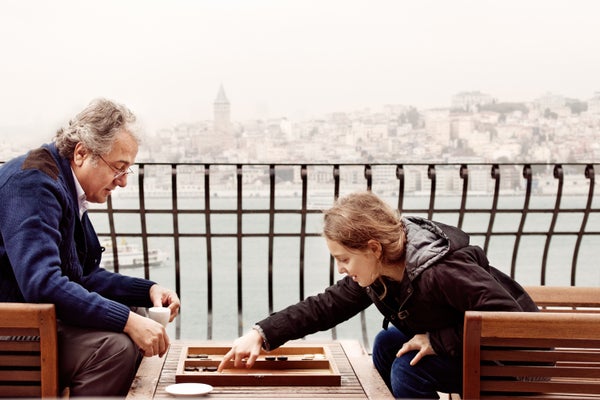This article was published in Scientific American’s former blog network and reflects the views of the author, not necessarily those of Scientific American
In all of our years of college and graduate school, my husband and I only had the chance to take the same course once. As a geologist and a civil engineer, we knew we were going to approach continuum mechanics differently. But neither of us anticipated just how differently. When placed side by side, our notes were almost unrecognizable. In mine, each equation or diagram was surrounded by call-out boxes and brief summaries. His was a series of equations with almost no text. A small paragraph in my notes would be an arrow and the word “linear” in his. And when studying, we both found the other’s notes equally useless. But as enlightening as that experience was, the more memorable insights – and greater joy – have come from comparing our approaches in a different context: games.
We got a glimpse into the future of our unique perspectives the first time we sat down to play Othello. Both of us had grown up playing the game, and both of us could beat most of the people we knew. It would be misleading to say that were evenly matched, even though we probably did win a comparable number of games. But most of those games were absolute blowouts. It had been a long time since either of us had looked at a board and gotten blindsided by an opponent. One would win, then the other – but always by huge margins. The problem: Our opponents growing up had trained us to play different games. My family played a game of angles; his family played the grid. We both planned turns ahead, but over the years I had honed my ability to spot threats from the diagonals. As a result, I would leave the perpendicular grid comparatively unprotected. For him, it was like oblique attacks were planned in stealth.
Families probably have their own experiences with contrasting strategies, from the go-for-broke builders in Monopoly to the person who buys dozens of development cards in Settlers of Catan. Faced with the same goal, and given the same tools, players will come at the problem from wildly different perspectives. My instinct is to celebrate when I come up against a strategy I haven’t faced before, because it gives me a chance to broaden my own view of the game. Losing dozens of games of Othello ended up making me a stronger player overall. Family game nights also held lessons about handling failure and dealing with shifting alliances. When one cousin determined that he no longer had a chance at winning, he would gleefully devote himself to wreaking equal-opportunity havoc on the other players. Another two cousins would rally together to take down the lead person and then claim a victory by either one as a shared win. Each game was different, and each held new lessons to learn.
On supporting science journalism
If you're enjoying this article, consider supporting our award-winning journalism by subscribing. By purchasing a subscription you are helping to ensure the future of impactful stories about the discoveries and ideas shaping our world today.
A friend of mine, however, preferred to stop between turns and lecture his opponents with, “Now, let me tell you why what you just did was wrong.” Rather than seeing new opponents as a sandbox to test new strategies, he saw it as his role to preach about what he saw as the most correct way to play. That instinct can be common when playing games against younger players. It is tempting for adults explain away approaches that haven’t worked for them rather than letting younger players see it for themselves. But just like the diagonal – vs – grid lessons I learned in Othello, facing a new opponent with completely different assumptions can benefit both players.
After more than a decade of facing off against my husband in games, I was reminded of the joy of a completely unexpected approach when we recently played a game that was not even meant for two players. Brain Dots, a simple app with the straight-forward task of getting two digital dots to touch on a screen, does not seem particularly exciting. But watching over each other’s shoulders quickly evolved into taking turns on attempts at each stage. And quite often our first instincts at solving the problem looked nothing alike. Where one might draw a ramp and create a pendulum, the other might box everything in (obstacles and all) and drop a heavy wedge to rocket the dots around. And when a solution started to fail – the dots heading perilously towards the edge of the screen – we would both jump in with increasingly inelegant measures to try to save them: giant blobs and rapidly drawn blockages with a heavy background of laughter.
And even though our competitive sides typically dominate when we play games – Quoridor has led to some long walks and cooling off periods – the joy in this case was completely shared. Low stakes, quick turns, and unlimited tries made the game feel more like a playground than a competition. When you only have to wait 5-10 seconds for your turn, it is easy to sit and enjoy the other player’s attempt before you try again. And, however inelegant, we were both delighted to celebrate a win. Removing some of the stakes opened the door to risky approaches and innovative solutions that a more cut-throat game might not have allowed. Competitive or collaborative, video or board, games have been an important way for me not just to learn about strategy and problem solving, but also that loss and failure are not the same thing.
